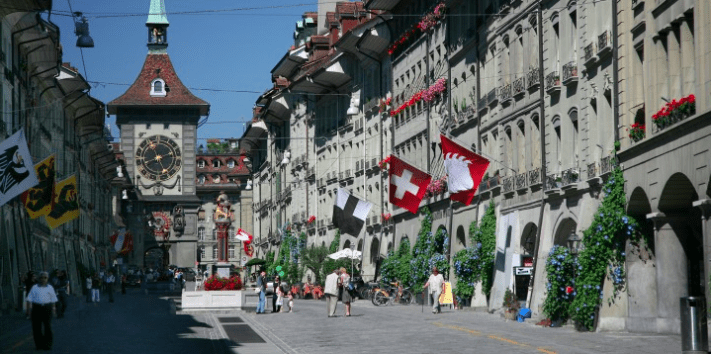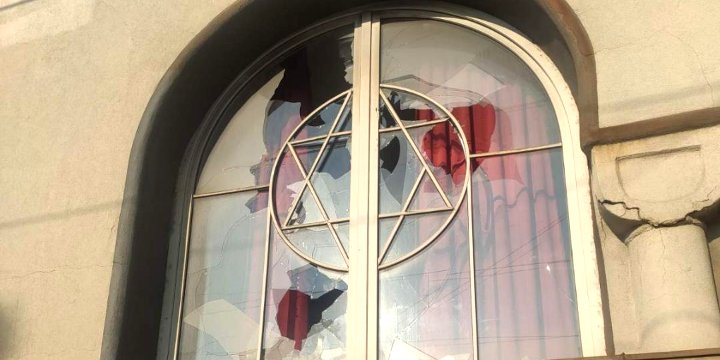After the recent terrorist murders of Jews in France, Belgium and Denmark, other Western European governments are beginning to understand that it is their legal and moral duty to protect the institutions of their Jewish minority.
Yet on this issue, Switzerland lags far behind other countries. This is particularly worrying in light of the deadly shooting in 2001 in a Zurich street, where an Israeli rabbi (recognizable as a Jew by his clothing) was murdered. The case has never been solved.
Switzerland has a population of 8.4 million; less than 18,000 are Jews.
The largest Jewish organization is the nominally orthodox Federation of Jewish communities (SIG). It has, at most, 12,000 members. Assessments by Swiss intelligence agencies and police over the past two years have shown that there are substantial threats against Jewish institutions there.
Because Switzerland is a federal state, it is sometimes unclear when security is the responsibility of the national government, the canton (province), or the municipality in which an institution is located. Overall, Jewish community security costs are estimated to be from $5 -7 million dollars a year, a large amount for such a small group.
The discussion on who is responsible for security (and paying for it) has been going on for several years. Only in October 2017 did the Swiss government admit for the first time that it has a duty to protect the Jewish minority –without saying how it would provide or pay for this security.
At the end of 2016, for example, it was scandalously suggested that Jews should create a fund with their own money in order to take care of their security. Some funds have been made available for one Jewish community in Zurich by the cantonthough these are not destined for security. For the other communities and synagogues in the town, no funds are provided.
The situation is particularly problematic in the third largest — and 212 year old — Jewish community of Basel, which faces a huge deficit and ultimately perhaps bankruptcy. It currently has the choice between reducing activities or having less security. First the government of the canton — and then the parliament (Grosser Rat) — voted down subsidizing security measures. The parliament has also refused to increase financing of the police force, despite the general terror threat in Europe and Switzerland.
But after the lethal Christmas market attack by a Muslim terrorist in Berlin in December 2016, measures were taken in Switzerland last year to protect Christmas markets. A heavily armed police presence was introduced, and several Christmas markets were fortified. Funding for these security measures was provided by the state.
One might recall some other elements of the unfriendly past attitudes of Switzerland to its Jews.
Switzerland only reluctantly granted its Jews full emancipation under US and French economic pressure. Switzerland was also the first European country to outlaw Jewish ritual slaughter in 1894; this was part of a desire to stop Jewish immigration from Eastern Europe.
During the Second World War, some of the Jews who fled from the Nazis were allowed in, but many others were returned to Nazi-occupied countries, where they faced lethal risks. After the war, a concentrated effort was made to force almost all of the 22,500 refugee Jews in the country to leave.
In the 1990s, it became known that Swiss banks had been systematically stalling efforts of Holocaust survivors to obtain money that their murdered relatives had placed there. In 1997, a case where a leading Swiss bank was caught destroying documents on dormant Jewish accounts shook the country to the core.
Ultimately the World Jewish Congress brought two American political adversaries together — US President Bill Clinton, a Democrat, and New York Republican Senator Al D’Amato. They took an interest in the dormant bank accounts issue, which led to pressure on Switzerland.
A commission led by the former Chairman of the US Federal Reserve, Paul Volcker, investigated the dormant bank accounts issue. One scandal it discovered was that the deposits in many such accounts had been eaten away by annual bank fees and service charges — or had simply been transferred to the banks’ profits.
The then-president of Switzerland, Jean-Pascal Delamuraz, claimed that Jewish organizations were trying to “blackmail Switzerland into paying them large sums of money to destabilize Switzerland and destroy its banking industry.” This made the scandal even bigger. His apology was considered insufficient.
In recent months, several American Jewish organizations and even US politicians have started to take an interest in Switzerland’s discriminatory attitude toward the security of Jewish institutions. If the Swiss authorities do not act in the near future in a substantial way on this issue, they may risk yet another scandal abroad.
But it would be far worse if a terrorist attack on a Jewish institution would happen before then.
The article was published in The Algemeiner















